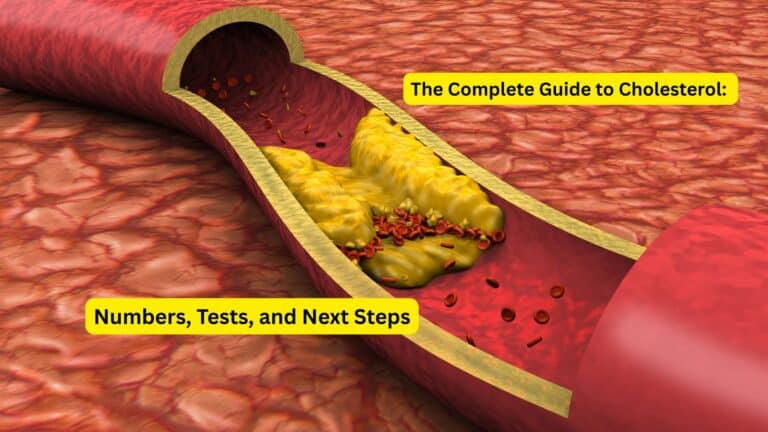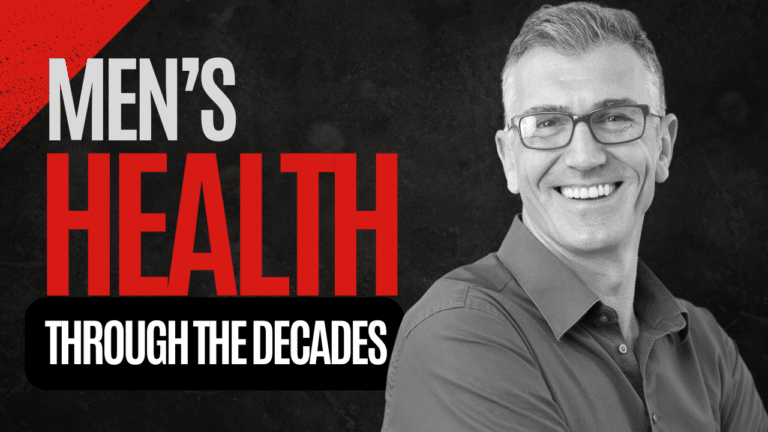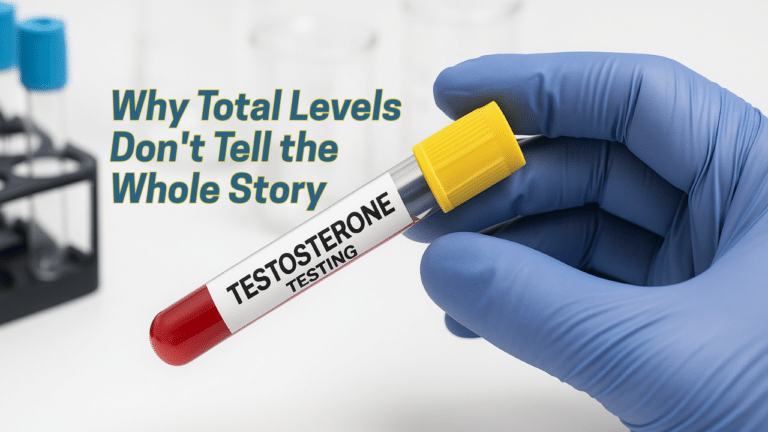The relationship between chronic stress and thyroid dysfunction creates a complex cycle that affects millions of people worldwide. When stress hormones like cortisol remain elevated for extended periods, they interfere with normal thyroid hormone production, conversion, and utilization—creating a cascade of symptoms that can persist even when standard thyroid tests appear normal. Understanding this cortisol-thyroid cycle is essential for anyone seeking to optimize their hormone balance and overall health.
Breaking free from this cycle requires a comprehensive approach that combines evidence-based stress management techniques with proper medical monitoring. Through targeted lifestyle interventions, mindfulness practices, and strategic lab testing, individuals can support both their stress response and thyroid function simultaneously. This integrated approach not only addresses symptoms but also tackles the root cause of hormonal imbalance.
The strategies outlined in this article focus on practical, science-backed methods to reduce cortisol levels, support thyroid health, and create lasting improvements in energy, metabolism, and overall well-being. By implementing these approaches alongside regular monitoring through thyroid panels and cortisol testing, readers can take control of their hormonal health and break the destructive stress-thyroid cycle.
How Stress Impacts Thyroid Function
Chronic stress creates a domino effect throughout the body’s hormone systems, with the thyroid gland being particularly vulnerable to these disruptions. When stress becomes persistent, it triggers changes in multiple hormone pathways that can suppress normal thyroid function and worsen existing thyroid conditions. The intricate relationship between stress hormones and thyroid hormones means that addressing one without considering the other often leads to incomplete treatment outcomes.
The HPA and HPT Axes
The hypothalamic-pituitary-adrenal (HPA) axis and the hypothalamic-pituitary-thyroid (HPT) axis work in close coordination under normal circumstances. However, chronic stress activation of the HPA axis leads to sustained cortisol release, which directly interferes with thyroid hormone synthesis and regulation. Elevated cortisol can impair the body’s responsiveness to thyroid hormones and disrupt the normal feedback mechanisms that maintain hormonal balance.
This disruption occurs at multiple levels, including the hypothalamus, pituitary gland, and thyroid tissue itself. Cortisol can suppress thyroid-stimulating hormone (TSH) release from the pituitary, reduce the conversion of inactive T4 to active T3 hormone, and decrease the sensitivity of target tissues to thyroid hormones. The result is a functional hypothyroid state that may not be detected by standard TSH testing alone.
Cortisol and Reverse T3
One of the most significant ways stress impacts thyroid function is through the production of reverse T3 (rT3), an inactive form of thyroid hormone. Under chronic stress, the body preferentially converts T4 to reverse T3 rather than the active T3 hormone, effectively blocking thyroid hormone activity at the cellular level. This mechanism explains why some individuals continue to experience hypothyroid symptoms despite having apparently normal thyroid hormone levels on routine testing.
Chronic stress can reduce thyroid-stimulating hormone (TSH) levels and impair conversion of T4 to T3, affecting up to 10-15% of people with subclinical hypothyroidism or persistent symptoms. This conversion problem means that standard thyroid panels may miss the underlying dysfunction, making comprehensive testing that includes reverse T3 levels crucial for accurate assessment.
The elevation of reverse T3 serves as a protective mechanism during acute stress, conserving energy for immediate survival needs. However, when stress becomes chronic, this adaptation becomes maladaptive, leading to persistent fatigue, brain fog, weight gain, and other hypothyroid symptoms that don’t respond well to standard thyroid hormone replacement therapy alone.
Autoimmune Triggers
Chronic stress plays a significant role in triggering and exacerbating autoimmune thyroid conditions such as Hashimoto’s thyroiditis and Graves’ disease. The sustained activation of the stress response system can dysregulate immune function, promoting inflammation and potentially triggering the development of thyroid antibodies in genetically susceptible individuals.
Autoimmune thyroid disorders affect approximately 5% of the U.S. population, with many patients reporting stress as a preceding factor or exacerbating trigger. The inflammatory cascade initiated by chronic stress can break down immune tolerance, leading the immune system to mistakenly attack thyroid tissue as foreign.
This autoimmune activation creates a vicious cycle where thyroid dysfunction increases stress on the body, which further promotes immune dysregulation and worsens thyroid antibody production. Breaking this cycle requires addressing both the stress response and the autoimmune component through comprehensive lifestyle and medical interventions.
Breaking the Cortisol-Thyroid Cycle
Successfully interrupting the destructive cycle between cortisol and thyroid function requires a multi-faceted approach that addresses both the physiological and psychological aspects of stress. The most effective interventions combine evidence-based stress reduction techniques with targeted lifestyle modifications that support both adrenal and thyroid health. Research demonstrates that consistent application of these strategies can lead to measurable improvements in both stress markers and thyroid function.
Lifestyle Strategies
Mind-body practices form the foundation of effective stress management for thyroid health. Mindfulness meditation, yoga, and deep breathing exercises have been scientifically proven to reduce cortisol levels and improve thyroid hormone utilization. An 8-week stress management program showed a significant decrease in thyroid autoantibodies (anti-TPO and anti-TG) and stress markers in women with Hashimoto’s thyroiditis, demonstrating the direct impact of stress reduction on autoimmune thyroid conditions.
Sleep hygiene represents another critical component of breaking the cortisol-thyroid cycle. Poor sleep quality and insufficient sleep duration directly elevate cortisol levels and impair thyroid hormone conversion. Establishing consistent sleep-wake cycles, creating optimal sleep environments, and practicing relaxation techniques before bedtime can significantly improve both stress resilience and thyroid function.
Regular practice of stress-reduction techniques helps reset the HPA axis and reduce chronic inflammation that contributes to thyroid dysfunction. Even simple practices like progressive muscle relaxation, guided imagery, or brief meditation sessions can begin to shift the body away from chronic stress activation toward a more balanced state that supports optimal thyroid function.
Exercise
Moderate physical activity serves as a powerful tool for stabilizing both immune function and hormone balance. Regular exercise helps reduce cortisol levels, improve insulin sensitivity, and support healthy thyroid hormone conversion. However, the intensity and type of exercise matter significantly for individuals with thyroid dysfunction, as excessive high-intensity training can actually increase cortisol and worsen thyroid symptoms.
The optimal exercise approach for thyroid health includes a combination of moderate aerobic activity, strength training, and flexibility work. Walking, swimming, yoga, and light resistance training provide the benefits of physical activity without overstressing an already compromised system. These activities help improve circulation, support lymphatic drainage, and enhance the body’s ability to utilize thyroid hormones effectively.
Timing of exercise also plays a crucial role in managing the cortisol-thyroid cycle. Morning exercise can help establish healthy cortisol rhythms, while intense evening workouts may interfere with sleep and hormone recovery. Finding the right balance requires attention to individual energy levels, stress tolerance, and recovery capacity.
Nutrition
Anti-inflammatory nutrition strategies provide essential support for both stress management and thyroid health. A diet rich in whole foods, healthy fats, and adequate protein helps stabilize blood sugar levels, reduce inflammation, and provide the nutrients necessary for optimal thyroid hormone production and conversion. Key nutrients include selenium, zinc, iron, and B vitamins, all of which play crucial roles in thyroid function.
Balancing macronutrients throughout the day helps maintain stable blood sugar levels and prevents additional stress on the adrenal glands. Chronic blood sugar fluctuations contribute to cortisol elevation and can worsen thyroid dysfunction. Including protein and healthy fats with each meal helps slow glucose absorption and provides sustained energy without triggering stress hormone release.
Avoiding inflammatory foods such as processed sugars, refined grains, and industrial seed oils can help reduce the overall inflammatory burden on the body. These dietary changes support both adrenal recovery and thyroid hormone sensitivity, creating a more favorable environment for breaking the cortisol-thyroid cycle.
Medical Management
Proper thyroid hormone replacement therapy plays a crucial role in supporting healthy cortisol patterns and stress resilience. When thyroid hormones are optimally replaced, the body’s stress response system functions more effectively, and cortisol levels tend to normalize. This highlights the importance of working with healthcare providers who understand the complex relationship between thyroid function and stress hormones.
Proper thyroid hormone replacement therapy helps in balancing cortisol and improving stress response, making medical management an essential component of breaking the cortisol-thyroid cycle. Some individuals may benefit from T3-containing medications or combination therapies that address both T4 and T3 levels directly.
Regular monitoring and adjustment of thyroid medications based on both symptoms and laboratory values ensures optimal hormone replacement. This may require testing beyond standard TSH levels to include Free T4, Free T3, reverse T3, and thyroid antibodies for a complete picture of thyroid function and its relationship to stress levels.
Lab Testing for Stress and Thyroid Health
Comprehensive laboratory testing provides the objective data needed to understand the complex relationship between stress hormones and thyroid function. Standard thyroid tests often miss important aspects of this interaction, making expanded testing panels essential for individuals experiencing persistent symptoms despite apparently normal results. The combination of thyroid function markers and stress hormone assessment creates a more complete picture that guides targeted interventions.
Thyroid Panel Testing
A comprehensive thyroid panel should include TSH, Free T4, Free T3, and reverse T3 to fully evaluate thyroid hormone production, conversion, and utilization. TSH alone provides limited information about actual thyroid hormone activity at the cellular level, particularly in individuals with chronic stress who may have suppressed TSH levels despite functional hypothyroidism.
Free T4 and Free T3 measurements reveal the actual amounts of active thyroid hormones available to tissues, while the ratio between T3 and reverse T3 indicates how efficiently the body is converting inactive T4 to active T3. This conversion process is significantly impacted by chronic stress and elevated cortisol levels, making these measurements crucial for understanding stress-related thyroid dysfunction.
Regular monitoring of these markers allows for tracking progress as stress management interventions are implemented. Many individuals see improvements in T3 to reverse T3 ratios as their stress levels decrease and cortisol patterns normalize, providing objective evidence that their interventions are working.
Thyroid Antibody Testing
Testing for thyroid antibodies, including anti-TPO (thyroid peroxidase) and anti-TG (thyroglobulin), helps identify autoimmune involvement in thyroid dysfunction. These antibodies often fluctuate in response to stress levels, making them valuable markers for monitoring the impact of stress management interventions on autoimmune activity.
Evidence-based stress management techniques such as meditation, yoga, mindfulness, and physical exercise have been shown to reduce stress, decrease thyroid antibody levels in autoimmune thyroiditis, and improve quality of life in thyroid patients. This demonstrates the direct connection between stress reduction and autoimmune stabilization.
Regular antibody monitoring can provide motivation and validation for individuals implementing stress management protocols. Seeing objective decreases in antibody levels reinforces the importance of continued stress reduction efforts and helps guide treatment decisions.
Cortisol Testing
Cortisol testing through saliva or serum samples provides direct measurement of stress hormone levels and their patterns throughout the day. Healthy cortisol follows a circadian rhythm with highest levels in the morning and gradual decline throughout the day. Chronic stress often disrupts this pattern, leading to elevated evening cortisol, flattened daily rhythms, or overall elevation.
Salivary cortisol testing offers the advantage of measuring free, bioactive cortisol levels and can be easily collected at home at multiple time points throughout the day. This provides a more comprehensive picture of cortisol patterns than single-point blood tests and helps identify specific abnormalities that may be contributing to thyroid dysfunction.
Walk-In Lab provides convenient, affordable access to both individual cortisol tests and comprehensive cortisol panels that assess daily patterns. This accessibility allows individuals to monitor their stress hormone levels as they implement interventions and track improvements over time without the need for physician referrals or insurance approvals.
Practical Tips for Patients
Successfully managing the cortisol-thyroid cycle requires consistent implementation of evidence-based strategies that address both stress reduction and thyroid support. The most effective approaches combine daily stress management practices with regular monitoring and professional guidance to ensure optimal outcomes. Small, consistent changes often produce more sustainable results than dramatic lifestyle overhauls that may add additional stress.
Incorporating daily relaxation practices into existing routines helps establish new neural pathways that support stress resilience. Even five to ten minutes of deep breathing, meditation, or gentle stretching can begin to shift the nervous system away from chronic stress activation. The key is consistency rather than duration—regular practice of brief stress-reduction techniques often proves more beneficial than sporadic longer sessions.
Sleep optimization deserves special attention as both a stress management tool and thyroid support strategy. Aiming for 7-9 hours of quality sleep in a cool, dark environment supports healthy cortisol rhythms and thyroid hormone conversion. Creating consistent bedtime routines, avoiding screens before sleep, and managing evening stress can significantly improve both sleep quality and hormone balance.
Tracking symptoms alongside laboratory results helps identify patterns and measure progress over time. Keeping a simple log of energy levels, mood, sleep quality, and physical symptoms can reveal connections between stress levels and thyroid function that might otherwise go unnoticed. This information also provides valuable data for healthcare providers making treatment decisions.
Partnering with a healthcare provider who understands the stress-thyroid connection ensures appropriate medication adjustments and monitoring. This collaboration is particularly important when implementing stress management interventions, as improvements in stress levels may require modifications to thyroid hormone replacement therapy. Regular communication about symptoms, lab results, and lifestyle changes helps optimize both medical and lifestyle interventions.
FAQs
How does stress affect thyroid hormones?
Chronic stress activates the hypothalamic-pituitary-adrenal (HPA) axis, increasing cortisol, which negatively affects thyroid hormone synthesis, conversion (T4 to active T3), and thyroid-stimulating hormone (TSH) regulation. This disruption can lead to functional hypothyroidism even when standard thyroid tests appear normal, as cortisol interferes with thyroid hormone activity at multiple levels throughout the body.
Can managing stress improve thyroid symptoms?
Yes, stress management interventions have been scientifically proven to improve thyroid function and reduce symptoms. Research demonstrates that techniques like meditation, yoga, and mindfulness can decrease thyroid antibody levels in autoimmune conditions and improve overall thyroid hormone utilization. Many individuals experience improvements in energy, metabolism, and other thyroid-related symptoms when they successfully reduce chronic stress levels.
Why do I still have symptoms if my labs are normal?
Standard thyroid tests may miss important aspects of thyroid dysfunction related to chronic stress. Elevated cortisol can impair thyroid hormone activity at the cellular level and increase production of reverse T3, an inactive form of thyroid hormone that blocks normal thyroid function. This explains why comprehensive testing including Free T3, reverse T3, and cortisol levels may reveal problems that standard TSH testing cannot detect.
Is stress linked to autoimmune thyroid disease?
Chronic stress can trigger immune dysfunction that may initiate or worsen autoimmune thyroid conditions like Hashimoto’s thyroiditis and Graves’ disease. The inflammatory cascade created by persistent stress can break down immune tolerance, leading the immune system to attack thyroid tissue. Many patients with autoimmune thyroid conditions report significant stress preceding their diagnosis or during flare-ups of their condition.
What are simple steps to break the cortisol-thyroid cycle?
Regular physical activity, mindfulness meditation, proper sleep, balanced nutrition, and possibly medical thyroid hormone management help break this cycle. Starting with just one or two interventions and building consistency before adding more strategies tends to be more successful than trying to change everything at once. The key is finding sustainable practices that reduce cortisol levels while supporting optimal thyroid function.
Conclusion
The intricate relationship between chronic stress and thyroid function creates a cycle that can significantly impact overall health and quality of life. Understanding how elevated cortisol levels disrupt thyroid hormone production, conversion, and utilization provides the foundation for effective intervention strategies. When stress management becomes a priority alongside proper thyroid care, individuals can experience meaningful improvements in energy, metabolism, and overall wellbeing.
Breaking the cortisol-thyroid cycle requires a comprehensive approach that combines evidence-based stress reduction techniques with appropriate medical monitoring and support. The strategies outlined in this article—from mindfulness practices and sleep optimization to targeted exercise and anti-inflammatory nutrition—work synergistically to address both stress hormones and thyroid function simultaneously.
Regular testing through comprehensive thyroid panels and cortisol assessment provides the objective data needed to guide interventions and track progress over time. Walk-In Lab’s accessible testing options for thyroid hormones, thyroid antibodies, and cortisol levels empower individuals to monitor their health proactively and make informed decisions about their care. By adopting consistent stress management practices and utilizing strategic lab testing, readers can take control of their hormonal health and break free from the destructive stress-thyroid cycle.
This content is for informational purposes only and does not replace professional medical advice. Always consult with a healthcare provider before making changes to your thyroid medication or treatment plan.






